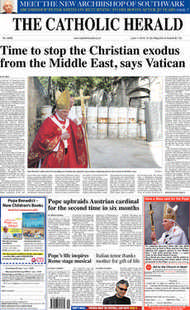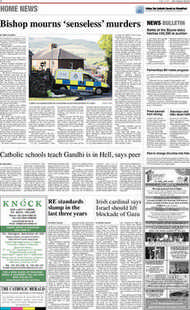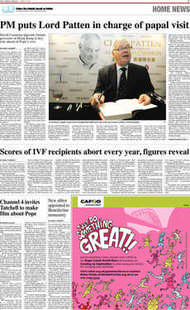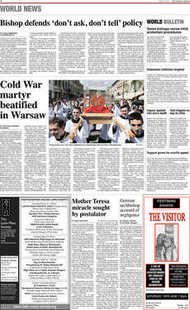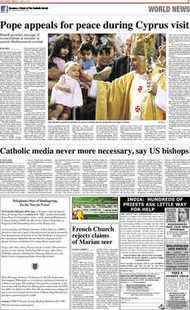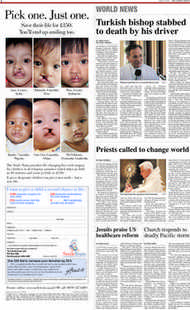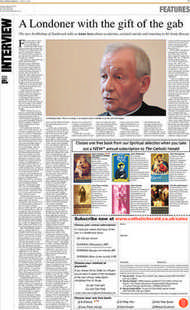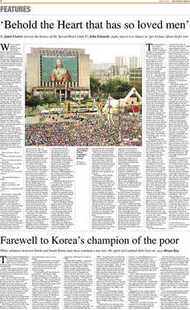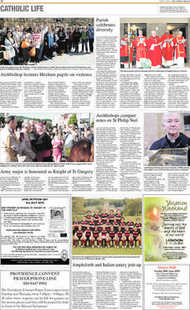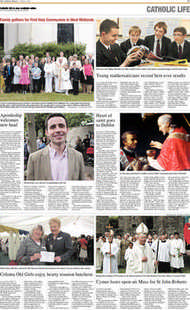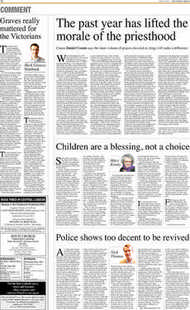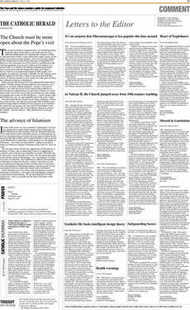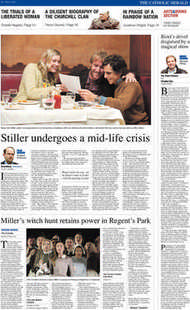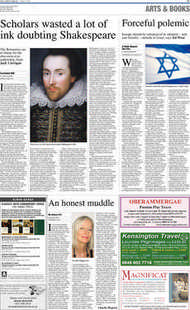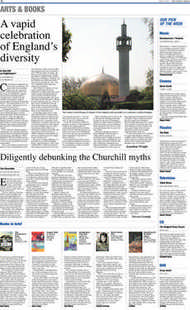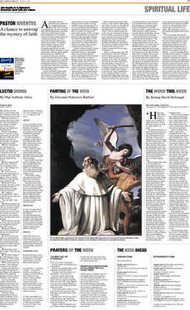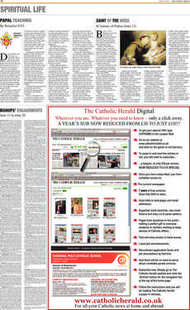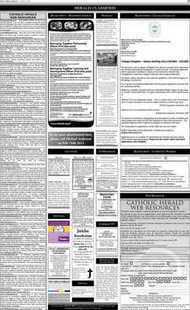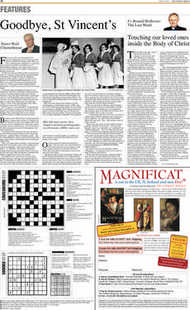Page 13, 11th June 2010
Page 13
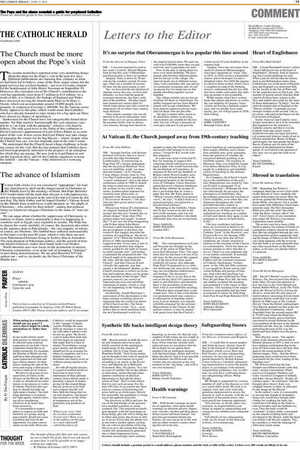
Report an error
Noticed an error on this page?If you've noticed an error in this article please click here to report it.
Tags
Share
Related articles
Beyond Doubt, Humanae Vitae Was Infallible
Newman, Conscience And The Pope: A Debate With Consequences
Theologian Defends Pope's Authority
Mgr. Lambruschini An Archbishop
Many Authorities Can Be Presented To Fr K Casey (letters,
At Vatican II, the Church jumped away from 19th-century teaching
From Mr John Wilkins SIR – Anyone familiar with Roman protocol will know that it is inconceivable that Mgr Ferdinando Lambruschini, in announcing as Pope Paul VI’s chosen spokesman that the encyclical Humanae Vitae was not infallible, made “an unauthorised remark”, as Fr Thomas Crean alleges (Letter, June 4). Nor was Mgr Lambruschini speaking at “a press conference”, but at the press conference called in 1968 to launch the long-awaited encyclical under the scrutiny of the world’s mass media. Lambruschini repeated his assertion soon afterwards, as reported in the Vatican newspaper L’Osservatore Romano: “The decision has been given and it is not infallible.” Discussing Vatican II’s declaration on religious freedom Fr Ian Ker accepts that this text “looked like an abrupt change” from what 19thcentury popes had taught. “Looked like”? I am very far from disagreeing with Fr Ker about John Henry Newman’s path-breaking theory of the development of doctrine, but would Fr Ker happily describe the contrary of a teaching as “the development” of it? When the Syllabus of Errors of 1864 repudiated any suggestion that “every man is free to embrace and profess that religion which, guided by the light of reason, he shall consider true”, and further condemned the proposition that “the Church ought to be separated from the state, and the state from the Church”, and then Vatican II said virtually the opposite, was that simply a development? Rather, as the Church continues to reflect on Scripture and tradition, there can be jumps in the direction of the Gospel. Then general councils can correct or supersede previous non-infallible statements of popes, which is what we see happening in the Vatican II declaration.
Incidentally, Joseph Ratzinger’s assessment of this declaration at the time contains a striking acknowledgement that the world was ahead of the Church on this. The future Pope Benedict wrote: “It is... scandalous that so much prodding from the de-Christianised world was needed to make the Church realise and recall what belongs to its own nature.” I hope Fr Ker would echo that judgment.
In a previous letter I criticised Fr Ker for seeming to suggest that scheming liberal subversives envisaged a pope who would function like the Archbishop of Canterbury. In response Fr Ker left the foothills of Britain where Herald readers actually live and betook himself to the theological heights of the German town of Tübingen. I have therefore asked that town’s famous inhabitant Hans Küng whether he accepts Fr Ker’s accusation that he wants a pope like that. He flatly denies it. “Where I mainly differ from present views,” he says, “is that I insist on a pastoral primacy, not primarily a jurisdictional primacy.” Returning to the foothills, I hope that Fr Ker wrote as he did in the heat of the moment, and was not suggesting that Catholics who think differently than him are in bad faith.
Yours faithfully, JOHN WILKINS London SW1 From Mr John Beaumont SIR – The correspondence on Cardinal Newman has brought up the issue of the status of Pope Paul’s encyclical Humanae Vitae. The argument thus far has been a re-run of an old story. In this account the supporters of the encyclical state, quite truthfully of course, that although Pope Paul VI proposed no ex cathedra definition, the encyclical’s teachings are nevertheless authoritative and binding. The dissenters’ response to this is to say that at the end of the day Paul VI’s pronouncement is non-definitive and therefore there is the possibility of dissent from what is non-infallible teaching.
What has been missed here is one simple fact. This is that a non-definitive pronouncement may contain a re-affirmation of teaching which, even if never defined, was already infallibly proposed by the ordinary Magisterium of the Church. In the present context, it may be argued with great force that the Church’s central teaching on contraception has been taught infallibly and is therefore certainly true, quite separately from the question of whether the encyclical defined anything in an infallible manner. The teaching in Humanae Vitae was infallibly taught even before Humanae Vitae. It was taught by a definitive and infallible course of teaching by the ordinary Magisterium.
As it happens, the Church’s teaching on the infallibility of the ordinary Magisterium was stated by Vatican II itself in paragraph 35 of Lumen Gentium: “Although the bishops individually do not enjoy the prerogative of infallibility, they nevertheless proclaim the teaching of Christ infallibly, even when they are dispersed throughout the world, provided that they remain in communion with each other and with the Successor of Peter and that in authoritatively teaching on a matter of faith and morals they agree in one judgment as that to be held definitively.” The four conditions laid down there are reviewed in detail in my article “Contraception, Authority and Catholic Truth” in the Homiletic and Pastoral Review for January 1998. Suffice it to say here that all four conditions are clearly satisfied in relation to the teaching of the Church on contraception. There has been no serious attempt to show that this is not so. There was one judgment and it was utterly consistent. It included many bishops, certain Eastern Fathers and the constant consensus of Catholic theologians. Furthermore, in the 19th and 20th centuries it was taught by Rome and by individual bishops and groups of bishops. And when that teaching was summed up and reaffirmed by Pope Pius XI and Pope Pius XII, the bishops readily accepted the teaching and promoted it with vigour in their dioceses. This teaching of the magisterium is unassailable and has been re-asserted of course by both Pope John Paul II and Pope Benedict XVI.
Yours faithfully, JOHN BEAUMONT Apperley Bridge, West Yorkshire
blog comments powered by Disqus


